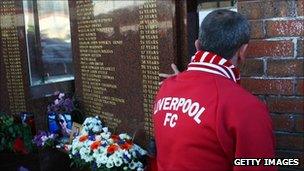Hillsborough files: Doubts on Cabinet Office case
- Published
- comments

The number of signatories on the demanding that the government disclose its files on the 1989 Hillsborough tragedy has now passed the 100,000 mark. This means that it has to be considered for debating time in the House of Commons.
But there are new questions about the Cabinet Office case for resisting publication of these records.
The Hillsborough petition calls for the release of all government documents relating to the disaster, "as requested by information commissioner Christopher Graham". Mr Graham was adjudicating on a freedom of information application made in 2009 by the 91╚╚▒Č.
It will now have to be discussed by the Commons backbench business committee, along with the petition to deprive rioters of benefits which is the other proposal to have passed the 100,000 target since the coalition government's new e-petition system was introduced.
The Commissioner ruled last month that the government should release files we had requested relating to discussions held by the then Prime Minister Margaret Thatcher about the incident, which caused the death of 96 Liverpool fans and was later blamed on a failure of police crowd control. He argued that it would add to public knowledge and understanding of how the Thatcher government responded to the event.
Views of ministers
Last week the Cabinet Office announced that it would appeal against Mr Graham's decision, triggering a highly effective publicity drive by Hillsborough campaigners which has led to over 100,000 signatures being added in less than a week.
The Cabinet Office argument is that any release of information should be managed by an (set up after our FOI request was made) which is to review the documentation about the Hillsborough tragedy and assess what should be made public.
I have now looked more carefully at the , and it is far from clear that it will actually promote the release of all the documents we asked for under FOI. Its planned programme of disclosures will exclude "information indicating the views of ministers, where release would prejudice the convention of Cabinet collective responsibility".
Yet the material we applied for includes records of cabinet and other ministerial meetings, and correspondence between the offices of Mrs Thatcher and her 91╚╚▒Č Secretary Douglas Hurd. These documents could easily come under the exception in the panel's terms of reference to do with revealing the views of ministers.
This suggests there could be a significant gap between the information the 91╚╚▒Č has requested and the records that the panel could end up releasing.
- Published4 August 2011